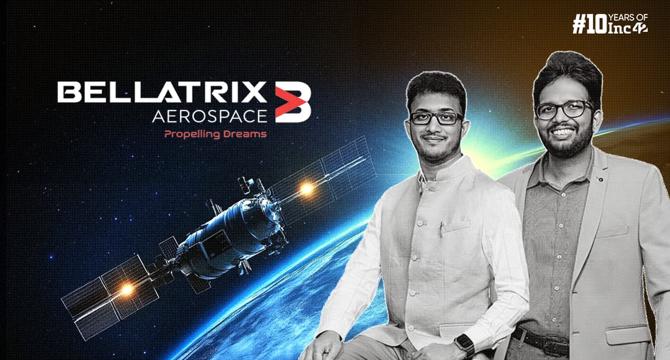Inc42
16h
176

Image Credit: Inc42
Bellatrix Aerospace’s Green Revolution: The Push For Cleaner Satellites
- Bellatrix Aerospace, a spacetech startup founded in 2015, has developed a green fuel propulsion system to power satellites. The project was developed by Rohan Ganapathy and Yashas Karanam to offer sustainable alternatives to the commonly used hydrazine, which is hazardous to nature and potentially carcinogenic. Since developing the technology, Bellatrix has obtained clearance to launch its ground developed Rudra and Arka propulsion systems, which have a higher density than traditional fuel sources. The startup's other products, including Jal, a water-based propulsion system, and Rudra nano, currently undergoing ground qualification, are aimed at alleviating propulsion issues associated with smaller CubeSats in geostationary and low earth orbits.
- Bellatrix's green propellant system is more sustainable than traditional propellant types, and offers a more than 60% reduction in handling costs compared to hydrazine. Arka Hall effect thrusters are unique due to their improved performance and operational life, and they offer cost and weight reduction compared to existing solutions. Rudra series of monopropellant thrusters are another product designed to replace hydrazine-based systems, taking over five years to complete ground development.
- Bellatrix has obtained backing from BASF Venture Capital GmbH, Pavestone Capital and Inflexor Ventures, along with investment from the Mankind Pharma family office, totaling $11m. Rudra and Arka were launched on board ISRO's PSLV C-58 launch vehicle in January 2024. Bellatrix's water-based Jal propulsion system is yet to clear ground qualification. As far as customers go, respondents fall into five categories: satellite and spaceteam providers, aerospace firms with space divisions, start-ups solving the use of traditional, hazardous propulsions, national governments, and government agencies, with the majority of Bellatrix's clients being ISRO and DRDO.
- Already looking toward expansion, Bellatrix is focusing on European and US markets. The start-up's founders plan to generate over $25m in revenue by 2027. Bellatrix's Project 200, recently demoed at Space Expo 2024, could solve the problem of ultra-low-earth orbit satellites which face significant atmospheric issues.
Read Full Article
10 Likes
For uninterrupted reading, download the app